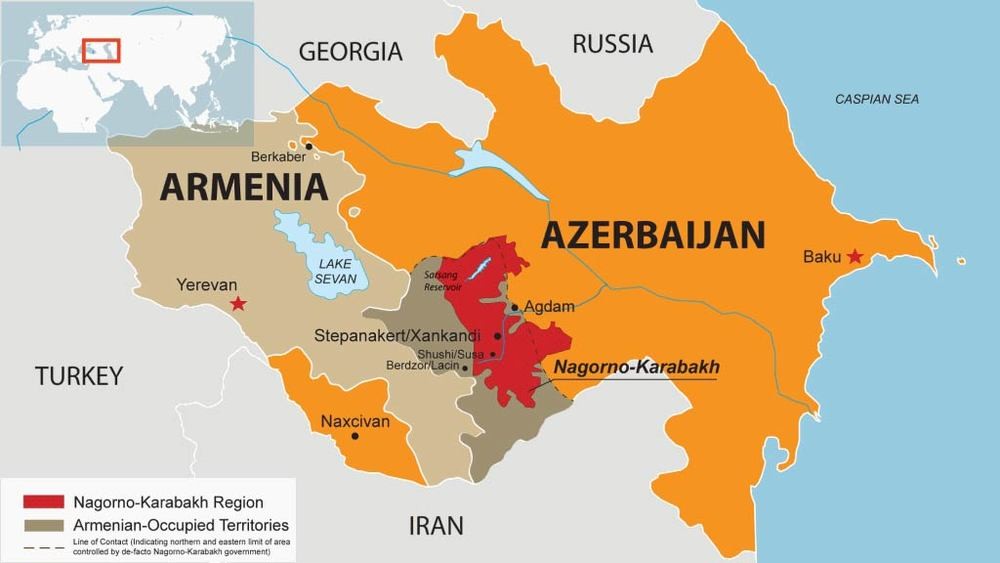 Op-Ed by Emily Thompson
Op-Ed by Emily Thompson
Nagorno-Karabakh’s Armenian-led government on Wednesday morning said they had agreed to a ceasefire after Azerbaijani forces attacked the area, sparking warnings of humanitarian disaster and risks of large-scale ethnic cleansing.
A separatist official in Nagorno-Karabakh said Wednesday there were hundreds of casualties after a day-long Azerbaijani military operation.
“There are at least 200 killed and more than 400 wounded,” the Karabakh region’s rights ombudsman, Gegham Stepanyan, announced on social media.
Azerbaijan declared a halt to its military operations in Nagorno-Karabakh, following the decision by the ethnic Armenian leadership in the contested territory to surrender their weapons in what appears to be a concession, ABC News reported.
Since the dissolution of the Soviet Union in 1991, the Armenians in Nagorno-Karabakh have been enmeshed in a territorial dispute with Azerbaijan over what they say is their ancestral land. The situation has taken a dire turn, with the growing threat of starvation and genocide.
Since last year, Azerbaijan is alleged to have imposed a blockade on the Lachin Corridor, the main artery linking Nagorno-Karabakh to the rest of the world. This siege severely jeopardizes the well-being of over 120,000 residents, including 30,000 children, who are at risk of running out of food, water, medical aid, and more. The global community remains largely unaware of this escalating crisis, and its magnitude often goes unreported and underestimated. This stark reality underscores the pressing need for global recognition and timely intervention.
Azerbaijan’s defense ministry said Armenian forces had agreed to “lay down their weapons, leave their combat positions and military posts and disarm completely. Units of the Armenian armed forces [will] leave the territories of Azerbaijan, illegal Armenian armed groups [will be] dissolved.”
Armenia and Azerbaijan have been embroiled in a longstanding dispute over the region of Nagorno-Karabakh since the dissolution of the Soviet Union. Although internationally recognized as Azerbaijani territory, Nagorno-Karabakh has predominantly been under the control of, and is mainly populated by, ethnic Armenians. This control solidified after intense clashes in the 1990s, a period that witnessed the fall of the Soviet Union. The complex history and demographics of the region have been major factors in the continued tensions between the two nations.
This crisis comes amid a sharp deterioration in the relationship between Armenia and Russia. Historically allies, the two countries have grown distant as Armenian Prime Minister Nikol Pashinyan and other officials in Yerevan have accused Moscow of failing to deliver on security commitments to Armenia, especially after Azerbaijan launched what it called “anti-terrorist operations” against the ethnic Armenian community.
For decades, Armenia trusted Russia to act as a security guarantor but now sees Russia’s peacekeeping force in Nagorno-Karabakh as ineffective. For its part, Russia is upset with Armenia for partnering with the United States in joint military exercises.
The problem is that a real tragedy is unfolding as leaders bicker and armed forces present a clear and present danger to the vulnerable Armenian population caught in between.
Pashinyan urged Russia and the United Nations to take action to stop the fighting.
“First of all, Russia must take steps and, secondly, we expect the UN Security Council to also take steps,” Pashinyan said. “We must not allow certain people, certain forces to deal a blow to the Armenian state. There are already calls, coming from different places, to stage a coup in Armenia.”
Russia, which brokered a ceasefire in 2020 and has peacekeepers in the region, has called for an end to the fighting.
“We are deeply concerned about the sharp escalation of the situation in Nagorno-Karabakh,” Ministry of Foreign Affairs spokeswoman Maria Zakharova said at a news briefing.
“The main thing is to prevent human casualties … the main thing is to convince Yerevan and Baku to come to the negotiating table,” Kremlin spokesman Dmitry Peskov told reporters.
Azerbaijan has broken its promise by resorting to military action in Nagorno-Karabakh, German Foreign Minister Annalena Baerbock said on the sidelines of the UN General Assembly (UNGA) in New York City.
“Baku’s promise to refrain from military action was broken. Azerbaijan must immediately stop shelling and return to the negotiating table,” he said.
The EU also condemned the escalation in Nagorno-Karabakh and called on Azerbaijan to stop its military activities, EU foreign policy chief Josep Borrell said in a statement.
“We call for the immediate cessation of hostilities & Azerbaijan to stop the current military activities,” he said on X, formerly known as Twitter.
But condemnations only go so far. The question is, where does everyone move forward from here? What is being done on the ground to save the Armenian people from yet another horrific genocide?
World leaders must take immediate action and hold Baku accountable and responsible for the well-being of all innocent civilians. At the same time, a safe passage must be opened to allow for the delivery of food, water, fuel, and other provisions for an indefinite amount of time and until a solution to the conflict is reached.
Without immediate action on the ground, the Armenians face another genocide.
Become a Patron!
Or support us at SubscribeStar
Donate cryptocurrency HERE
Subscribe to Activist Post for truth, peace, and freedom news. Follow us on SoMee, Telegram, HIVE, Flote, Minds, MeWe, Twitter, Gab, and What Really Happened.
Provide, Protect and Profit from what’s coming! Get a free issue of Counter Markets today.

Be the first to comment on "Armenians in Mortal Danger as Azerbaijan Kills 200 in Nagorno-Karabakh"